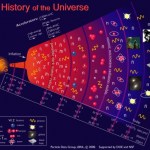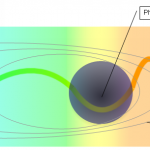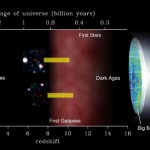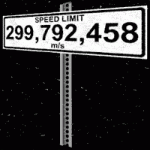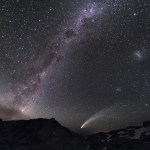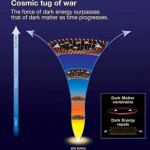Relativity
So, the Universe started with a bang. Everything was hot, dense, and expanding.
It's 13.7 billion years later now, and our Universe is cold and sparse. The temperature of the leftover glow from the big bang -- which used to be over 10^30 degrees -- is now down to 2.7 Kelvin, just barely above absolute zero. The Universe used to be denser than the center of the Sun. Now, on average, the density of the Universe is only about one proton per cubic meter, with mass clumped into stars and galaxies separated by trillions of miles.
But, for all of it, the Universe is still expanding. What's amazing…
Last week, we began talking about understanding the size of the Universe, and we continued this week with some information on distances and motion in the Universe. This brings us to my favorite application, which leads to the Hubble expansion:
Redshift. You see, whenever an atom or molecule emits light, it gives off that light at a very few particular wavelengths. For instance, if you have hydrogen, you'll always get light at wavelengths of 656 nanometers (red), 486 nm (cyan), 434 nm (indigo), 410 nm (violet), and 397 nm (on the border of violet/ultraviolet):
Now there are three things --…
At the end of last week, I wrote a post explaining how the Universe is so big (93 billion light years across) when it's only 13.7 billion years old. The key visualization is to think of space as being the surface of an expanding balloon, while all the things in the Universe (stars, galaxies, etc.) are like ants on that surface.
Now, I explained to you that two ants will appear to move apart from one another due to the expansion of the Universe, even though neither ant is moving relative to the surface of the balloon. If I use light to measure whether this other ant is moving away from me, I…
I get a certain question every so often, and it's one of the most difficult questions any cosmologist faces. Today, I try to tackle it. It goes something like this:
If the Universe is 13.7 billion years old, and nothing can go faster than the speed of light, how is it that we see things that are 46.5 billion light years away?
First off -- and I want to clarify this -- everything in this question is legit.
1.) The Universe is 13.7 billion years old. There are small errors there -- no one would be surprised if it was 13.5 billion or 14.0 billion years old -- but it's definitely not 12 billion…
The coolest things about science are often at the frontiers. We love to press the limits of nature: to cool things down as close as possible to absolute zero, to raise energies as high as possible, and to speed them up as fast as possible. But when it comes to speed, there's an absolute limit: the speed of light in vacuum.
Relativity tells us why this is the absolute limit: the faster you want to go, the more energy it takes. But, as you get close to the speed of light, you effectively increase the mass of your speedy particle, which makes it ever harder to accelerate it. In fact, it would…
On June 30, 1905 Albert Einstein published his paper on Special Relativity with the paper "On the Electrodynamics of Moving Bodies" in the journal Annalen der Physik (original German version in pdf here).
This was Einstein's third of what have become known as the Annus Mirabilis papers (Latin for "extraordinary year") and revolutionized the field of physics by reconciling Maxwell's equations for electricity and magnetism with the laws of mechanics. He was 26 years old. In this paper Einstein also dispelled with the concept of "luminiferous ether" (proposed by Isaac Newton in 1704), a…
100 years ago, the way we viewed our Universe was vastly different than the way we view it now. The night sky, with stars, planets, comets, asteroids, nebulae, and the Milky Way, was viewed to make up the entire contents of the Universe.
The Universe was static, governed by two laws only: Newton's Gravity and Maxwell's Electromagnetism. There were the first hints that the Universe was made up of quantum particles, such as the photoelectric effect, Rutherford's first hints at the existence of the nucleus, and Planck's view that energy was quantized. But other than that -- and Einstein's new…
Let's get something out in the open: not all science fiction is scientifically possible. Some of it is possible, but the laws of nature are pretty strict, and they prevent us from doing a number of things that -- in principle -- would be incredible to do. Examples on both sides, please?
You got it. Wall-crawling like Spider-Man? Totally possible. Just graft enough gecko fibers onto a person and not only will you be climbing walls, but also ice, oily surfaces, and even teflon!
Shrink rays? A la Fantastic Voyage? Completely impossible, unfortunately. Protons, neutrons, and electrons are stuck…
I caught this interesting sentence over at Marginal Revolution:
as consumption approaches satiation, workers reduce their hours of work to prevent themselves from actually reaching satiation. More technically, as workers approach satiation, their labor supply curves start to "bend backwards." The result is that rising labor demand stemming from rising productivity raises wages yet reduces employment.
Reminds me of relativity. Thus, one would assume that satiation, like the speed of light, is a level of consumption that a workers can never reach.
I have no idea whether this comparison is…
In a comment on my last post, What is Dark Energy, Kendall asks the following, which is such a good one I think it deserves its own post:
I thought the expansion was accelerating? Aren’t you saying that it is on its way down to 85% of its current rate? Sounds like expansion is slowing, but still leaves us with an open universe…
People do say the expansion of the Universe is accelerating. But that doesn't mean that the expansion rate is accelerating. It means that if you take a look at any one galaxy that isn't gravitationally bound to us in the Local Group (that is, any big galaxy that isn't…
There's a graduate student that I'm sort-of mentoring/working with at Arizona, named Xiaoying Xu (hi Xiao!). She's bright and curious, and she asks some very good questions. She asked me one yesterday that's pretty tough to wrap your head around:
How do I explain to someone why light doesn't age?
Well, here on Earth, time progresses at a certain speed. That is, if I measure how many seconds tick by as the Earth revolves once around the Sun, I'll get 31,556,926 seconds. (31,558,150 if I'm measuring a sidereal year.)
But let's say in the course of that year, I put you on a rocket ship, and…
Let me set the scene for you: I'm fresh off my Ph.D., teaching introductory physics at the University of Wisconsin. I'm trying to demonstrate how to turn potential energy into kinetic energy, and so I ask this simple question:
What is Energy?
And I get a stunned silence back from the room. One of those silences where 25 faces look back at you with eyes that say, "no, you're the one teaching us; you need to answer that one!"
And I confess, this is one of those questions that's looks like the easiest thing in the world, and yet there's no good answer for it. Put simply, energy is possibly…
Apparently, this is becoming a good place for people to get their questions answered! My friend Brian, recently wanted to know what the possibilities were for faster-than-light travel. Specifically, he was interested in it because he wants humans to do it.
Brian: but otherwise how will we ever have a civilization like that in Star Trek?
Presumably, Brian's goal is to be able to travel nearly instantaneously between any two points in the galaxy. The problem is that there are physical laws we have to obey; we don't have a choice. One of them is special relativity, which tells us that the…
